-
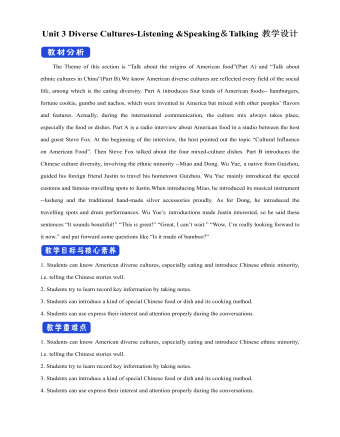
新人教版高中英语必修3Unit 3 Diverse Cultures-Listening &Speaking&Talking教学设计
1. In Picture 1 and Picture 2, where do you think they are from? How do you know?From their wearings, we can know they are from ethnic minority of China--- Miao and Dong.Picture 1, they are playing their traditional instrument lusheng in their traditional costumes.Picture 2. the girls are Miao because they wear their traditional costumes and silver accessory.2. In Picture 3, can you find which village it is? What time is it in the picture?It is Dong village. It is at night. Step 2 While-listeningJustin met a new friend while traveling in Guizhou. Listen to their conversation and complete the summaries below.Part 1Justin and Wu Yue watched some Miao people play the lusheng. The instrument has a history of over 3,000 years and it is even mentioned in the oldest collection of Chinese poetry. Then they watched the lusheng dance. Justin wanted to buy some hand-made silver/traditional accessories as souvenirs. He was told that the price will depend on the percentage of silver. Part 2They will go to a pretty Dong minority village called Zhaoxing. they will see the drum towers and the wind and rain bridges. They may also see a performance of the Grand Song of the Dong people.Step 3 Post-listening---TalkingWork in groups. Imagine Justin is telling some friends about his trip to Guizhou. One of you is Justin and the rest of you are his friends. Ask Justin questions about his trip and experience. The following expressions may help you.
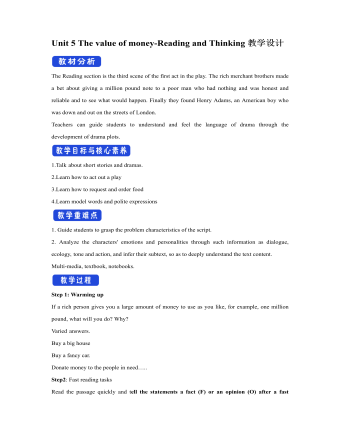
新人教版高中英语必修3Unit 5 The value of money-Reading and Thinking教学设计二
? Could you offer me some kind of work here?? I don’t want your charity, I just want an honest job.? Careless: I landed in Britain by accident.Step 7:Consolidation.? Find Henry? Roderick and Oliver were I .making a bet when they saw Henry, a poor young man. ? Know Henry? About a month ago, Henry was sailing and later he found himself carried out to sea by a strong wind. Fortunately, he 2.was spotted by a ship. And it was the ship that brought him to 3.England? Offer money to Henry ? Oliver and Roderick gave Henry a letter and told him that there was money in it. They 4.persuaded him to accept it, and made him 5.promise that it wouldn't be opened until 2 o'clock.Step 8:Language pointsa large amount of: a large quantity of; a great deal ofe.g. They bought a large amount of furniture before they moved their new house.make a bet: make an arrangement to risk money, etc. on an event of which the result is doubtful.e.g. We made a bet on the result of the match.permit sb to do something: allow somebody to do somethinge.g. My mother doesn’t permit me to ride in the street after it rained.by accident: as a result of chancee.g. I only found it by accident.stare at: look at somebody or something with the eyes wide open in a fixed gaze( in astonishment, wonder, fear, etc)to be honest: to tell you the truth; to be franke.g. To be honest, I don’t think we have a chance of winning.Step7 Homework:What do you think will happen to Henry? Will the bank-note help him or get him into trouble?
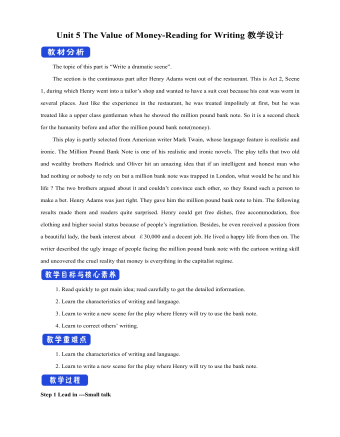
新人教版高中英语必修3Unit 5 The Value of Money-Reading for Writing教学设计二
2. 您能看到, 我头发太长了。You can see that my hair is much too long.3. 无论什么时候, 只要您想回来就回来。Please come back whenever you want.4. 您仅有很少的头发要理! You only have too little hair to cut !5. 为您服务是我的荣幸!It is my honour to serve you!Step 9 Writing(Henry is walking down the street when he sees a sign for a place that cuts hair. He decides to have it cut. )H=Henry B=BarberH: Good afternoon, I’d like to have my hair cut, if I may. (The barber looks at Henry’s hair and continues cutting another man’s hair. ) Er, I’d really like a haircut. As you can see it’s much too long. B: (in a rude manner) Yes, I can see that. Indeed, I can. H: Fine, well, I’ll have a seat then. (He sits in one of the barber’s chairs. The barber turns to look at Henry. )B: It’s quite expensive here, you know! Are you sure you can afford it?H: Yes. I think so. (After his hair is cut, the barber tells Henry how much he must pay. Henry shows the barber the bank note. )B: Why Mr. . . (looks shocked)H: Adams. Henry Adams. I’m sorry. I don’t have any change. B: Please don’t worry! (wearing a big smile) Nothing to worry about! Nothing at all! Please come back whenever you want, even if you only have too little hair to cut! It will be my honour to serve you!Step 10 Pair workExchange drafts with a partner. Use this checklist to help your partner revise his/her draft.1. Are all the elements of a play included and in good order ?2. Do the character use suitable language ?3. Are the stage directions clear and useful ?4. Is the plot clear and exciting enough ?
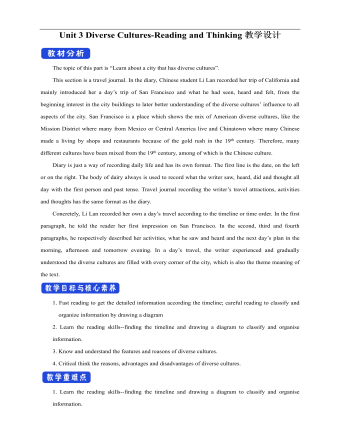
新人教版高中英语必修3Unit 3 Diverse Cultures-Reading and Thinking教学设计
Discuss these questions in groups.Q1: Have you ever been to a place that has a diverse culture ? What do you think about the culture diversity ?One culturally diverse place that I have been to is Harbin, the capital city of Heilongjiang Province. I went there last year with my family to see the Ice and Snow Festival, and I was amazed at how the culture as different to most other Chinese cities. There is a big Russian influence there, with beautiful Russian architecture and lots of interesting restaurants. I learnt that Harbin is called “the Oriental Moscow” and that many Russians settled there to help build the railway over 100 years ago.Q2: What are the benefits and challenges of cultural diversity ?The benefits: People are able to experience a wide variety of cultures, making their lives more interesting, and it can deepen the feelings for our national culture, it is also helpful for us to learn about other outstanding culture, which helps improve the ability to respect others. The challenges: People may have trouble communicating or understanding each other, and it may lead to disappearance of some civilizations and even make some people think “The western moon is rounder than his own.”Step 7 Post reading---RetellComplete the passage according to the text.Today, I arrived back in San Francisco, and it feels good (1) _____(be) back in the city again. The city succeeded in (2)_________ (rebuild) itself after the earthquake that (3)________ (occur) in 1906, and I stayed in the Mission District, enjoying some delicious noodles mixed with cultures. In the afternoon, I headed to a local museum (4)____ showed the historical changes in California. During the gold rush, many Chinese arrived, and some opened up shops and restaurants in Chinatown to earn a (5)_____ (live). Many others worked on (6)______ (farm), joined the gold rush, or went to build the railway that connected California to the east. The museum showed us (7)____ America was built by immigrants from (8)________ (difference) countries and cultures. In the evening, I went to Chinatown, and ate in a Cantonese restaurant that served food on (9)________(beauty) china plates. Tomorrow evening, I’m going to (10)__ jazz bar in the Richmond District. 答案:1. to be 2. rebuilding 3. occurred 4. that 5.living6. farms 7.how 8. different 9. beautiful 10. a
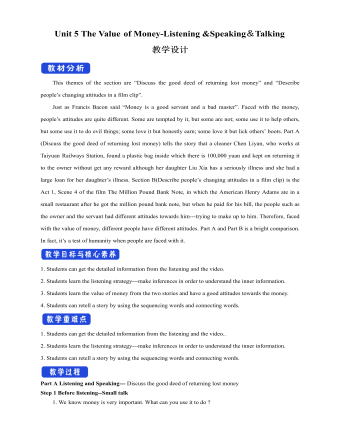
新人教版高中英语必修3Unit 5 The Value of Money-Listening &Speaking&Talking教学设计
4. A:We’d like to have someone to say a word at the beginning to welcome the group.B:↙Who?A:We thought that you or Dr.Johnson might do it.B用降调说Who,其意思是问,对方想让谁在开场时致欢迎词。Step 6 Pronunciation---Practice1. Listen to the short conversation and mark the intonation with ↗, ↙ or ↙, ↗. Then discuss with a partner what they intend to convey by using different intonation.Owner: You know what ?↗ It’s a million-pound bank note↙.Waiter 1: Really ?↗(question)Waiter 2: Really !↙(unbelievable and surprised)Waiter 3: Really ?!↙↗(first question then surprised)2. Listen to the conversations. Underline the parts that are stressed and mark the intonation. Then talk about the implied meanings of the responses with different intonations. Listen again and repeat.1) Henry: It’s a nice suit.Owner: Oh, it’s perfect!↙(The intonation means it is very suitable for Henry.)2) Henry: Well, that’s very kind of you.Owner: Kind, sir ?↗(what you said is not right) No, it’s kind of you. You must come whenever you want and have whatever you like. Just having you sit here is a great honour !!↙(welcome you to come again)3)Henry:Well, to be honest, I have none. Oliver:(happily) What luck!(excited) Brother↗, what luck!↙(It means “Didn’t you hear it?”)Henry: Well, it may seem lucky to you but not to me!↗(angry) If this is your idea of some kind of joke, I don’t think it’s very funny. Now if you’ll excuse me, I ought to be on my way.↙(If so, I would leave.)Roderick: Please don’t go↙...(hope Henry can wait for a moment)Part B Viewing and Talking---Describe people’s changing attitudes in a film clipStep 1 Before-listening---Tell the filmYou are going to watch part of the film The Million Pound Bank Note. Look at these photos and guess what happens in the film.
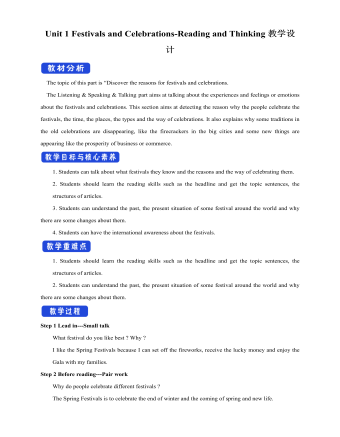
新人教版高中英语必修3Unit 1 Festivals and Celebrations-Reading and Thinking教学设计
The topic of this part is “Discover the reasons for festivals and celebrations.The Listening & Speaking & Talking part aims at talking about the experiences and feelings or emotions about the festivals and celebrations. This section aims at detecting the reason why the people celebrate the festivals, the time, the places, the types and the way of celebrations. It also explains why some traditions in the old celebrations are disappearing, like the firecrackers in the big cities and some new things are appearing like the prosperity of business or commerce. 1. Students can talk about what festivals they know and the reasons and the way of celebrating them.2. Students should learn the reading skills such as the headline and get the topic sentences, the structures of articles.3. Students can understand the past, the present situation of some festival around the world and why there are some changes about them. 4. Students can have the international awareness about the festivals.1. Students should learn the reading skills such as the headline and get the topic sentences, the structures of articles.2. Students can understand the past, the present situation of some festival around the world and why there are some changes about them.Step 1 Lead in---Small talkWhat festival do you like best ? Why ?I like the Spring Festivals because I can set off the fireworks, receive the lucky money and enjoy the Gala with my families.Step 2 Before reading---Pair workWhy do people celebrate different festivals ?The Spring Festivals is to celebrate the end of winter and the coming of spring and new life.The Mid-autumn Day is to celebrate the harvest and admire the moon.
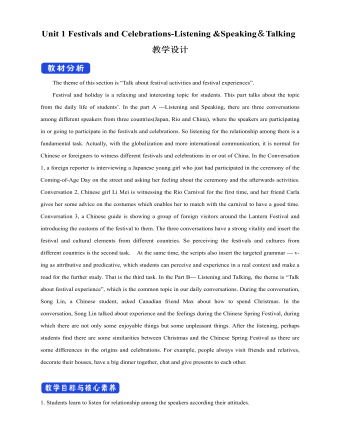
新人教版高中英语必修3Unit 1 Festivals and Celebrations-Listening &Speaking&Talking教学设计
The theme of this section is “Talk about festival activities and festival experiences”.Festival and holiday is a relaxing and interesting topic for students. This part talks about the topic from the daily life of students’. In the part A ---Listening and Speaking, there are three conversations among different speakers from three countries(Japan, Rio and China), where the speakers are participating in or going to participate in the festivals and celebrations. So listening for the relationship among them is a fundamental task. Actually, with the globalization and more international communication, it is normal for Chinese or foreigners to witness different festivals and celebrations in or out of China. In the Conversation 1, a foreign reporter is interviewing a Japanese young girl who just had participated in the ceremony of the Coming-of-Age Day on the street and asking her feeling about the ceremony and the afterwards activities. Conversation 2, Chinese girl Li Mei is witnessing the Rio Carnival for the first time, and her friend Carla gives her some advice on the costumes which enables her to match with the carnival to have a good time. Conversation 3, a Chinese guide is showing a group of foreign visitors around the Lantern Festival and introducing the customs of the festival to them. The three conversations have a strong vitality and insert the festival and cultural elements from different countries. So perceiving the festivals and cultures from different countries is the second task. At the same time, the scripts also insert the targeted grammar --- v-ing as attributive and predicative, which students can perceive and experience in a real context and make a road for the further study. That is the third task. In the Part B--- Listening and Talking, the theme is “Talk about festival experience”, which is the common topic in our daily conversations. During the conversation, Song Lin, a Chinese student, asked Canadian friend Max about how to spend Christmas. In the conversation, Song Lin talked about experience and the feelings during the Chinese Spring Festival, during which there are not only some enjoyable things but some unpleasant things. After the listening, perhaps students find there are some similarities between Christmas and the Chinese Spring Festival as there are some differences in the origins and celebrations. For example, people always visit friends and relatives, decorate their houses, have a big dinner together, chat and give presents to each other.
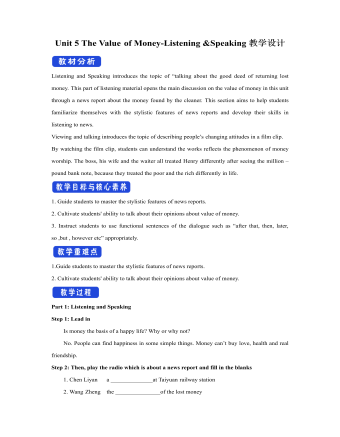
新人教版高中英语必修3Unit 5 The Value of Money-Listening &Speaking教学设计
Step 4: Listen again and decide if the following statements are true (T) or false (F).1 It was the first time Chen Liyan's story was reported. T口 F口2 Chen found 10,000 yuan in a small plastic bag in Taiyuan railway station口 F口3 Wang Zheng apologized to Chen because he couldn't offer her more money. T口 F口4 Chen took out a large loan to cure her daughter, T口 F口5 Wang set up a fundraising website for Chen's daughter after Chen told him about her situation. T口 F口Step 5:After listening, discuss the questions.1 What kind of person do you think Chen Liyan is?Chen Liyan is generous and honest because she returned a large sum of money to the owner.2 Did Chen return the money because she didn't need it?No. She returned the money because it was the right thing to do. Evidence for this is that she refused to accept the reward money because she felt that it had not been earned. 3 Is it common for people to do what Chen did?It depends on the culture. In some countries it is quite common to return money that has been found. In other countries, people believe "Finders are keepers!" 4 How did Wang Zheng feel about the return of his money?He must have been very happy and relieved to have gotten his money back. We know this because he thanked Chen repeatedly and even offered her a reward.5 Why did Ma Dongbao tell Wang about Chen's family?He must have had great sympathy for Chen and her daughter and wanted to help them.'We know this because he arranged help for them. 6 How did the news reporter feel about Chen's actions?The news reporter felt that it showed that money wasn't the most important thing in life. We know this because the reporter told us that this is what Chen believes. and then said, “that's a great attitude to take."
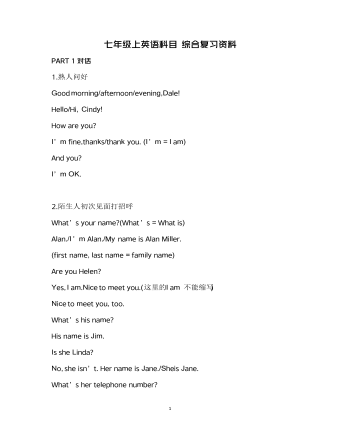
部编版英语七年级上总复习知识点教案
2.陌生人初次见面打招呼What’s your name?(What’s = What is)Alan./I’m Alan./My name is AlanMiller.(first name,last name = family name)Are you Helen?Yes, I am.Niceto meet you.(这里的Iam 不能缩写)Nice to meetyou, too.What’s his name?His name isJim.Is she Linda?
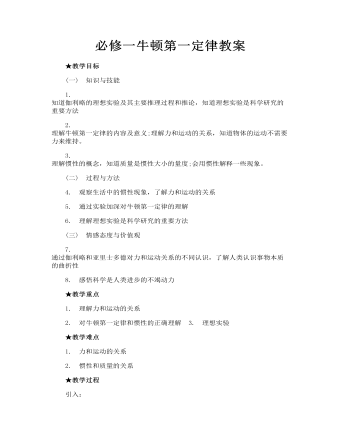
必修一牛顿第一定律教案
(二)?过程与方法? 4.?观察生活中的惯性现象,了解力和运动的关系? 5.?通过实验加深对牛顿第一定律的理解? 6.?理解理想实验是科学研究的重要方法? (三)?情感态度与价值观? 7.?通过伽利略和亚里士多德对力和运动关系的不同认识,了解人类认识事物本质的曲折性? 8.?感悟科学是人类进步的不竭动力
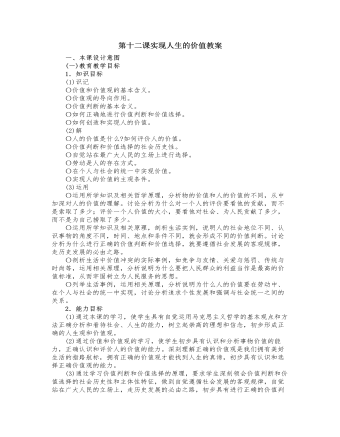
人教版高中政治必修4第十二课实现人生的价值教案
有的学者还指出,要坚持集体主义还必须将集体主义的价值精神与社会主义市场经济的要求结合起来,批判地继承计划经济时代倡导的集体主义,合理地对其进行体系结构的调整和内容的更新,形成新的集体主义。与传统的集体主义相比,这种新的集体主义应具有如下两个主要特点。其一,强调集体的出发点是为了维护集体成员的正当个人利益。传统的集体主义具有片面强调集体至上性、绝对性的弊端;新的集体主义必须依据社会主义市场经济的现实要求,将集体应当对个人承担的义务加以科学的阐释。真正的集体应该维护各个集体成员的个人利益,实现组成集体的各个主体的自我价值。这种新型的集体主义是对社会主义市场经济条件下社会关系的真实反映,既与个人主义有本质区别,也不同于传统的集体主义。其二,要体现道德要求的先进性与广泛性的统一。
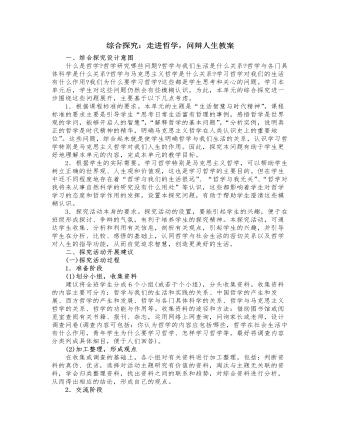
人教版高中政治必修4综合探究:走进哲学,问辩人生教案
1.根据课程标准的要求。本单元的主题是“生活智慧与时代精神”,课程标准的要求主要是引导学生“思考日常生活富有哲理的事例,感悟哲学是世界观的学问,能够开启人的智慧”,“解释哲学的基本问题”,“分析实例,说明真正的哲学是时代精神的精华,明确马克思主义哲学在人类认识史上的重要地位”。这些问题,综合起来就是使学生明确哲学与我们生活的关系,认识学习哲学特别是马克思主义哲学对我们人生的作用。因此,探究本问题有助于学生更好地理解本单元的内容,完成本单元的教学目标。2.根据学生的实际需要。学习哲学特别是马克思主义哲学,可以帮助学生树立正确的世界观、人生观和价值观,这也是学习哲学的主要目的。但在学生中还不同程度地存在着“哲学与我们的生活很远”、“哲学与我无关”、“哲学对我将来从事自然科学的研究没有什么用处”等认识,这些都影响着学生对哲学学习的态度和哲学作用的发挥。设置本探究问题,有助于帮助学生澄清这些模糊认识。
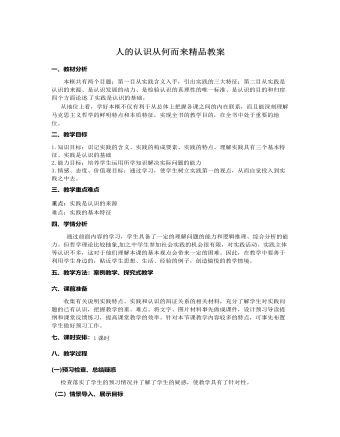
人教版高中政治必修4人的认识从何而来精品教案
一、教材分析本框共有两个目题:第一目从实践含义入手,引出实践的三大特征;第二目从实践是认识的来源、是认识发展的动力、是检验认识的真理性的唯一标准、是认识的目的和归宿四个方面论述 了实践是认识的基础。从地位上看,学好本框不仅有利于从总体上把握各课之间的内在联系,而且能深刻理解马克思主义哲学的鲜明特点和本质特征,实现全书的教学目的,在全书中处于重要的地位。二、教学目标1.知识目标:识记实践的含义、实践的构成要素、实践的特点。理解实践具有三个基本特征、实践是认识的基础2.能力目标:培养学生运用所学知识解决实际问题的能力3.情感、态度、价值观目标:通过学习,使学生树立实践第一的观点,从而自觉投入到实践之中去。三、教学重点难点重点:实践是认识的来源难点:实践的基本特征
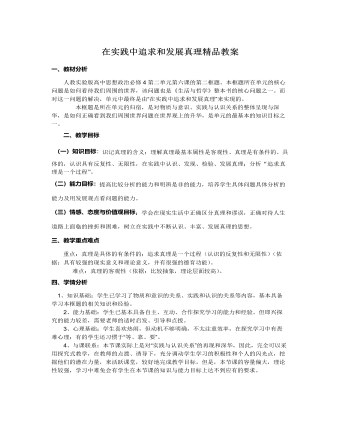
人教版高中政治必修4在实践中追求和发展真理精品教案
一、教材分析人教实验版高中思想政治必修4第二单元第六课的第二框题。本框题所在单元的核心问题是如何看待我们周围的世界,该问题也是《生活与哲学》整本书的核心问题之一。而对这一问题的解决,单元中最终是由“在实践中追求和发展真理”来实现的。 本框题是所在单元的归宿,是对物质与意识、实践与认识关系的整体呈现与深华,是如何正确看到我们周围世界问题在世界观上的升华,是单元的最基本的知识目标之一。 二、教学目标(一)知识目标:识记真理的含义;理解真理最基本属性是客观性、真理是有条件的、具体的,认识具有反复性、无限性,在实践中认识、发现、检验、发展真理;分析“追求 真理是一个过程”。(二)能力目标:提高比较分析的能力和明辨是非的能力,培养学生具体问题具体分析的能力及用发展观点看问题的能力。(三)情感、态度与价值观目标:学会在现实生活中正确区分真理和谬误,正确对待人生道路上面临的挫折和困难,树立在实践中不断认识、丰富、发展真理的思想。
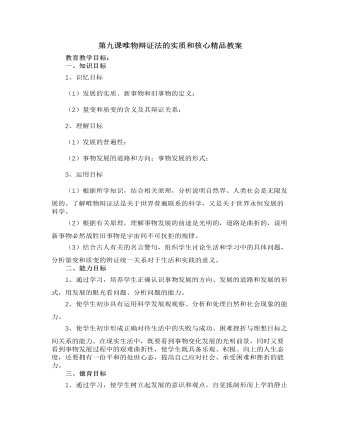
人教版高中政治必修4第九课唯物辩证法的实质和核心精品教案
a矛盾的同一性是矛盾双方相互吸引、相互联结的属性和趋势。它有两方面的含义:一是矛盾双方相互依赖,一方的存在以另一方的存在为前提,双方共处于一个统一体中;同一事物都有对立面和统一面两个方面,一方的存在以另一方为条件,彼此谁都离不开谁(形影想随、一个巴掌拍不响、不是冤家不聚头)。【举例】P67漫画:他敢剪吗?悬挂在山崖上的两个人构成一种动态的平衡。【举例】磁铁(S极和N极);没有上就没有下、没有香就没有臭、没有福就无所谓祸;【举例】父子关系(父亲之所以是父亲,因为有儿子,儿子之所以是儿子,因为有父亲);师生关系;二是矛盾双方相互贯通,即相互渗透、相互包含,在一定条件下可以相互转化。 【相关衔接】P68生物变性现象,雌雄转化现象【举例】生产与消费具有直接统一性
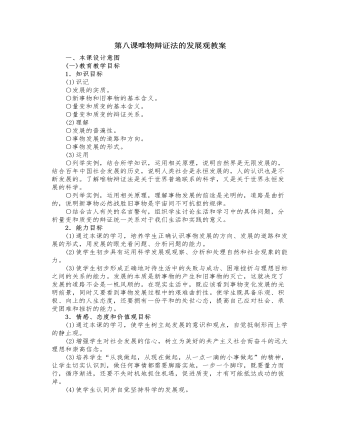
人教版高中政治必修4第八课唯物辩证法的发展观教案
1973年4月的一天,一名男子站在纽约的街头,掏出一个约有两块砖头大的无线电话,并开始通话。这个人就是手机的发明者马丁,当时他是摩托罗拉公司的工程技术人员。这是当时世界上第一部移动电话。1985年,第一台现代意义上的可以商用的移动电话诞生。它是将电源和天线放置在一个盒子里,重量达3公斤。与现代形状接近的手机诞生于1987年,其重量大约750克,与今天仅重60克的手机相比,像一块大砖头。此后,手机的“瘦身”越来越迅速。1991年,手机重量为250克左右。1996年秋,r出现了体积为100立方厘米、重量100克的手机。此后,又进一步小型化,轻型化,到1999年就轻到了60克以下。手机的体积越来越小,但功能却越来越多。以前的手机是用来通话的,现在的手机是用来享受的。今天,手机可以是相机、游戏机、音乐播放器、信用卡、电影院……手机带来的不仅仅是通信方式的改变,更是生活方式的变革。
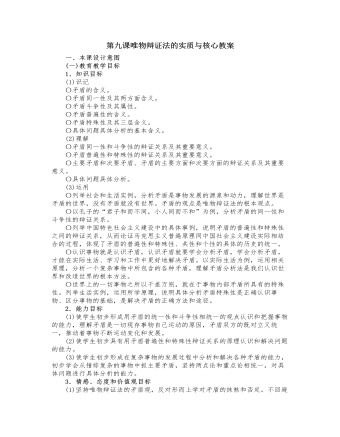
人教版高中政治必修4第九课唯物辩证法的实质与核心教案
探究活动8(教材第72页):“结合生活事例,谈谈你在面对复杂事物时是如何分析和解决矛盾的?”这一探究活动是在学生还不了解主次矛盾的原理时,让他们回忆自己在生活中有没有遇到过面对许多矛盾时是如何解决的经历。比如,每天面对很多作业,先做哪门课作业后做哪门作业,你是如何考虑的?在学校面对学习、体育运动和社会工作,你是怎么安排的?在生活中,你遇到这样的情况都是怎样解决的?通过探究活动,使学生弄清主次矛盾的原理,学会用矛盾分析法分析问题。探究活动9(教材第73页):“你在生活中是如何分析具体问题的?”这一探究活动,强调的是“你”在生活中是如何运用分析法分析具体问题的,要紧紧围绕学生这一中心,首先强调具体问题具体分析的方法非常重要,这是马克思主义的一个原则,是马克思主义的活的灵魂。引导学生主动运用这种分析方法分析看待自己,分析看待社会。可以组织学生进行讨论、交流,还可以让学生撰写小论文,写出自己运用这种分析方法分析了哪些具体问题,有哪些感受。
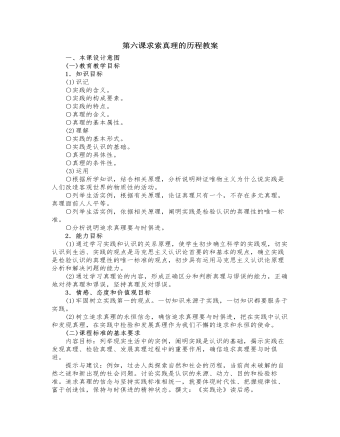
人教版高中政治必修4第六课求索真理的历程教案
农业科学的周期是以年为时间单位,一次实验就要等到一次花开、结果。就这样,几个实验误导了袁隆平好几年。这时登在《参考消息》上的一篇不起眼的文章像给迷途中的袁隆平以当头一棒:克里克、沃森和威尔金斯发现DNA螺旋结构,西方的遗传学研究进入分子水平。“我当时还在那里搞什么无性杂交,糟糕得很”。水稻是自花授粉植物,雄蕊雌蕊都在一朵花里面,雌雄同株,没有杂种优势一杂种优势是生物界的普遍现象,小到细菌,大到人,近亲繁殖的结果是种群的退化。但是水稻因为花小,其杂交是当时公认的世界难题,设在马尼拉的世界水稻研究中心就是因为困难重重,差点关闭。袁隆平偏不信这个邪,他突发灵感:专门培养一种特殊的水稻品种——雄花退化的雄性不育系,没有自己的花粉,这样不就可以做到杂种优势了吗?于是,漫长的寻找过程开始了,要找到这样一株雄花退化而且杂交之后产量猛增的“太监”水稻简直是大海捞针。
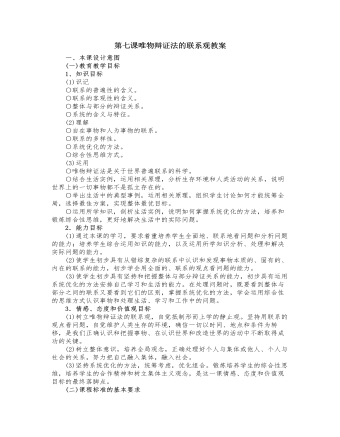
人教版高中政治必修4第七课唯物辩证法的联系观教案
2.能力目标(1)通过本课的学习,要求着重培养学生全面地、联系地看问题和分析问题的能力;培养学生综合运用知识的能力,以及运用所学知识分析、处理和解决实际问题的能力。(2)使学生初步具有从错综复杂的联系中认识和发现事物本质的、固有的、内在的联系的能力,初步学会用全面的、联系的观点看问题的能力。(3)使学生初步具有坚持和把握整体与部分辩证关系的能力,初步具有运用系统优化的方法安排自己学习和生活的能力。在处理问题时,既要看到整体与部分之间的联系又要看到它们的区别,掌握系统优化的方法,学会运用综合性的思维方式认识事物和处理生活、学习和工作中的问题。3.情感、态度和价值观目标(1)树立唯物辩证法的联系观,自觉抵制形而上学的静止观。坚持用联系的观点看问题,自觉维护人类生存的环境,确信一切以时间、地点和条件为转移,是我们正确认识和把握事物、在认识世界和改造世界的活动中不断取得成功的关键。

人教版高中政治必修4第三课时代精神的精华教案
此探究活动的目的是为了说明马克思主义哲学是科学完整的体系。在探究活动时可以首先向学生简单介绍西方哲学的发展历史,使学生对马克思主义哲学在整个西方哲学中的位置和地位有个大致了解。离开了这个大的背景,学生对马克思主义哲学就容易摸不着头绪。马克思主义哲学之前的唯物主义的局限性表现在:古代朴素的带有辩证法性质的唯物主义主要是追问世界的本原问题,这时的哲学缺乏近代科学作为基础,因此它更多的是一种猜测。它虽然看到了世界的联系和变化,但它还无法理解联系和变化背后的基础和原因。近代形而上学的唯物主义主要是追问人的认识问题,即人的认识的来源是什么,是什么保证人的认识的可靠性。但它对人的认识问题的解决主要是立足于对世界的一种直观观察,认为人的认识来源于对世界的直观的、机械的反映。它不理解人的实践活动,不理解人是在改造世界的过程中认识世界,人的认识是在实践基础上的能动反映。





















